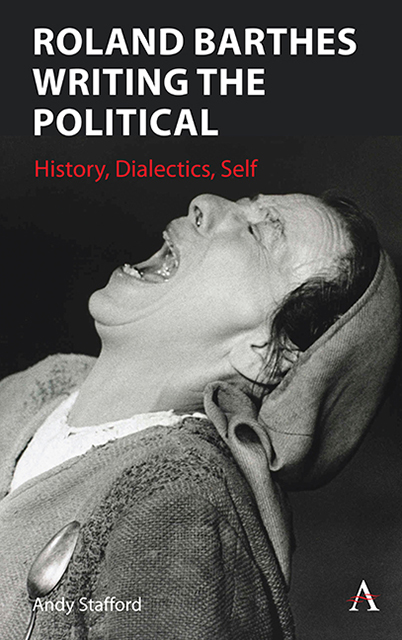Book contents
- Frontmatter
- Contents
- Acknowledgements
- Foreword
- Chapter One ‘The Dialectical Logic of Love’
- Chapter Two ‘Amorous Dialectic’
- Chapter Three ‘The People Chorus’
- Chapter Four ‘Double Grasp’
- Chapter Five ‘Stereographic Space’
- Chapter Six ‘Non-Classifiable’
- Chapter Seven ‘New Dialectic’
- Chapter Eight ‘Opacity’
- Chapter Nine ‘Undialectics’
- Afterword: Essayism and the Politics of Writing
- Bibliography
- Index
Chapter Four - ‘Double Grasp’
Published online by Cambridge University Press: 08 June 2023
- Frontmatter
- Contents
- Acknowledgements
- Foreword
- Chapter One ‘The Dialectical Logic of Love’
- Chapter Two ‘Amorous Dialectic’
- Chapter Three ‘The People Chorus’
- Chapter Four ‘Double Grasp’
- Chapter Five ‘Stereographic Space’
- Chapter Six ‘Non-Classifiable’
- Chapter Seven ‘New Dialectic’
- Chapter Eight ‘Opacity’
- Chapter Nine ‘Undialectics’
- Afterword: Essayism and the Politics of Writing
- Bibliography
- Index
Summary
My interpretation of history will […] be marked by the materialism of Marx and the mysticism of Michelet.
(Jaurès 1956, 167)The specificity of History is to organise the progressive unveiling of what happened by way of an epicentre that is external to the crisis itself; it is to substitute the idea of time by that of structure.
(Barthes 2002, I, 541)Radical [Hi]story
With these words, we mark in this chapter the extraordinary and life-long fascination that Barthes has with the nineteenth century (Sun 2014), even imagining Marx, Mallarmé, Nietzsche and Freud meeting in 1876 (2013, 6). Indeed the quotation above from Jean Jaurès – from the introduction to his huge ‘socialist history’ of the Great French Revolution – seems to go to the heart of Barthes's political ideas at least at the start of his career, up to and including what Stedman Jones (1983, 48) calls the early Lukács's ‘marriage between romantic anti-scientific lebensphilosophie and historical materialism’. First, because Jaurès was assassinated in 1914, whilst trying to argue against a war that was going to turn into a blood-bath, and in which Barthes lost his father he never knew (Stafford 2015a, 15–17). Second, the strong influence of Jaurès's socialism, well attested in Barthes's early correspondence in 1932 with his life-long friend Philippe Rebeyrol (Barthes 2018, 2, 4–5) points to the consistency of Barthes's left-wing beliefs. But, perhaps the most important for the purposes of this chapter, is that Jaurès was a historian (and not the first) that we now call ‘from below’, who used a historiographical writing that went directly against official History. This ‘History from below’, typified by the works of its recent practitioner, Raphael Samuel – younger member of the group of mainly British Communists who, by turn, were influenced by the French historians Georges Lefebvre, Lucien Febvre and Albert Mathiez – is what characterized the interest that Barthes had developed in the historiography of Jules Michelet.
The play on words ‘history/story’ in the title of this section above refers, at the same time, to Barthes's extensive work of 1968–69 on the curious story by the nineteenth-century writer (and contemporary of Michelet) Honoré de Balzac called Sarrasine, the ‘re-writing’ of which by Barthes and his postgraduate students in Paris became his 1970 essay S/Z.
- Type
- Chapter
- Information
- Roland Barthes Writing the PoliticalHistory, Dialectics, Self, pp. 75 - 98Publisher: Anthem PressPrint publication year: 2022



